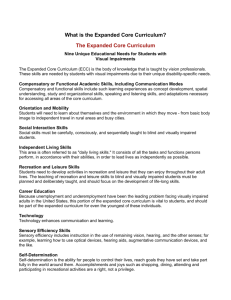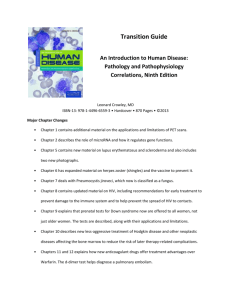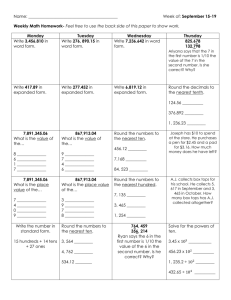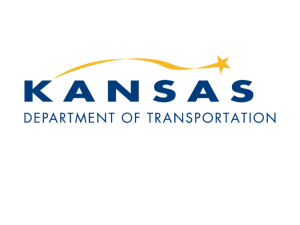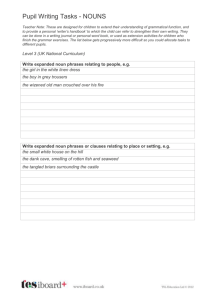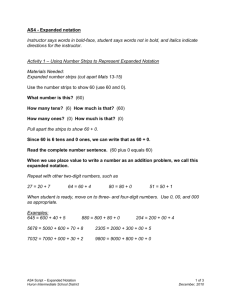expanded_core_self_paced_syllabus
advertisement
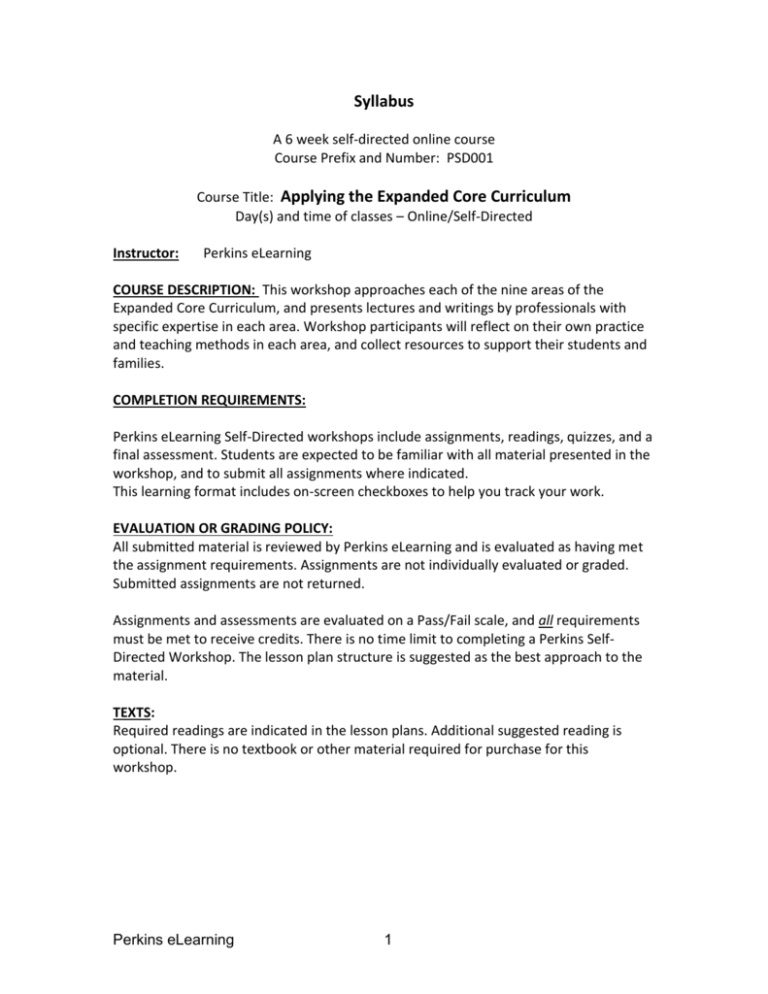
Syllabus A 6 week self-directed online course Course Prefix and Number: PSD001 Course Title: Applying the Expanded Core Curriculum Day(s) and time of classes – Online/Self-Directed Instructor: Perkins eLearning COURSE DESCRIPTION: This workshop approaches each of the nine areas of the Expanded Core Curriculum, and presents lectures and writings by professionals with specific expertise in each area. Workshop participants will reflect on their own practice and teaching methods in each area, and collect resources to support their students and families. COMPLETION REQUIREMENTS: Perkins eLearning Self-Directed workshops include assignments, readings, quizzes, and a final assessment. Students are expected to be familiar with all material presented in the workshop, and to submit all assignments where indicated. This learning format includes on-screen checkboxes to help you track your work. EVALUATION OR GRADING POLICY: All submitted material is reviewed by Perkins eLearning and is evaluated as having met the assignment requirements. Assignments are not individually evaluated or graded. Submitted assignments are not returned. Assignments and assessments are evaluated on a Pass/Fail scale, and all requirements must be met to receive credits. There is no time limit to completing a Perkins SelfDirected Workshop. The lesson plan structure is suggested as the best approach to the material. TEXTS: Required readings are indicated in the lesson plans. Additional suggested reading is optional. There is no textbook or other material required for purchase for this workshop. Perkins eLearning 1 LEARNING OUTCOMES / OBJECTIVES: Knowledge: As a result of the learning experiences in the course, you will learn: The history of the Expanded Core Curriculum Research established teaching strategies specific to expanded core skills development Skill: As a result of the learning experiences in the course, you will be able to: Assess a student’s preferred sensory skill(s) Define IEP goals related to the Expanded Core Curriculum Design and adapt activities specific to expanded core skills Caring: As a result of the learning experiences in the course, you will become more competent in your ability to: Engage parents and families in supporting expanded skill development Prepare a student for a fully-rounded adult life Ethical: As a result of the learning experiences in the course, you will become more competent in your ability to: Provide expanded core curriculum experiences in a variety of learning environments Align activities and lessons to a student’s identified proficiencies and stated goals INSTRUCTIONAL STRATEGIES [Place an X for each strategy you use while teaching this course.] X X X _X X Lecture (recorded) Discussion/Questioning Laboratory X Problem Finding/Solving X_ Discovery Interviewing Viewing or Listening to Followed by Journaling Reflective Responses Data Collection and Analysis Pre-Practicum Role Playing/Simulation Independent Learning Field Trips COURSE REQUIREMENTS The required assignments for this course are listed below. Please see the individual session description for more detail about each assignment. The learning platform also provides checkboxes that can help you monitor your completion. Perkins eLearning 2 COURSE CONTENT / TOPICAL OUTLINE Session One: Introduction and History Session Goals: Upon completion of this session the participant will be able to : Name the 9 specific areas of development that make up the Expanded Core Curriculum Explain the history and development of the Expanded Core Curriculum Identify a student’s areas of strength and opportunities for development in the Expanded Core areas Readings: American Foundation for the Blind, The Expanded Core Curriculum for Blind and Visually Impaired Children and Youths (2014); Perkins School for the Blind, Expanded Core Curriculum; Research: History of the Expanded Core Curriculum Assignment: Evaluating proficiency in the expanded core areas Session Two: Compensatory Skills / Sensory Efficiency Session Goals: Upon completion of this session, the participant will be able to: Describe the typical development of senses and sensory processing Explain the benefits of using symbol systems in the education of students with multiple disabilities, including deafblindness Provide parents and families suggestions for reinforcing skills at home Identify a teaching strategy that addresses Compensatory Skills and Sensory Efficiency Readings: Expanded Core Curriculum Advocacy (AFB & Perkins School for the Blind), Compensatory Skills and the Expanded Core Curriculum; Compensatory Skills and the Expanded Core Curriculum; Braille Literacy and the Expanded Core Curriculum Jim Durkel, "What Should Professionals Do to Help Reinforce Listening Skills?" and "What Can Families Do at Home to Support Their Child's Listening Skills?" Multi-Media: “Tangible Symbols,” with Elizabeth Torrey; Research: Identify a teaching strategy or branded program in this skills area Assignment: Describe teaching strategies that address skill-building in these areas Perkins eLearning 3 Session Three: Social Interaction / Recreation and Leisure Session Goals: Upon completion of this session, participants will be able to: Explain the importance of social and recreational skills to childhood development Relate childhood social activities to necessary adult skills Apply social/recreational information to a student’s educational experience Readings: Expanded Core Curriculum Advocacy (AFB & Perkins School for the Blind), Social Interaction Skills and the Expanded Core Curriculum; and Recreation, Fitness, and Leisure and the Expanded Core Curriculum Multi-Media: “Developing Social Skills,” with Dr. Sharon Sacks Research: Identify recreational opportunities for children and young adults with visual impairments, including those with additional disabilities Assignment: Apply social/recreational information to a student’s educational experience Session Four: Independent Living / Career Education Session goals: Upon completion of this session, the participant will be able to : Describe age-appropriate career-planning activities Explain the differences between services provided for children and adults with disabilities Define a range of transition planning goals and experiences Readings: Expanded Core Curriculum Advocacy (AFB & Perkins School for the Blind), Independent Living Skills and the Expanded Core Curriculum; and Age-Appropriate Career Education and the Expanded Core Curriculum; Multi-Media: “Transition for All Ages,” with Dorinda Rife; “No More Confusion about Transition to Adult Services,” with Beth Jordan Research: Personal narratives of adults who are blind Assignment: Explain the importance of transition planning Session Five: Orientation & Mobility / Assistive Technology Session Goals Upon completion of this session, participants will be able to: Define traditional O&M instruction, as well as identify adaptations for wheelchair users Identify ways to support assistive technology in general education settings Describe the basic gestures and settings for using VoiceOver with iOS devices Perkins eLearning 4 Articulate arguments for and against long cane training for young children Analyze the skills required for using mobility aids and assistive devices Readings: Expanded Core Curriculum Advocacy (AFB & Perkins School for the Blind), Orientation and Mobility and the Expanded Core Curriculum; and Assistive Technology and the Expanded Core Curriculum Multi-Media: “Wheelchair O&M,” with James Scott Crawford; “iOS Accessibility for Users Who are Visually Impaired,” with Jim Denham Research: Exploring the case for and against long cane training for children Assignment: Analyze the skills required for using mobility aids and assistive devices Session Six: Self-Determination Session Goals Upon completion of this session, participants will be able to: Describe the characteristics of a self-determined individual Apply principles of self-determination to a specific stage of individual development Identify opportunities for expanded core skill development Readings: A Practical Guide for Teaching Self-Determination, Sharon Field, Jim Martin, et al, Reston VA: Council for Exceptional Children, 1998; Expanded Core Curriculum Advocacy (AFB & Perkins School for the Blind), SelfDetermination and the Expanded Core Curriculum; Beckman, Owens, Steuer, Self-Determination: Learn How to Get What You Need... Multi-Media: “Non-Driving Strategies for Youth Who Are Visually Impaired,” with Dr. Penny Rosenblum Assignment: Identify skill development opportunities in a typical day for a child with disabilities FINAL QUIZ Perkins eLearning 5
